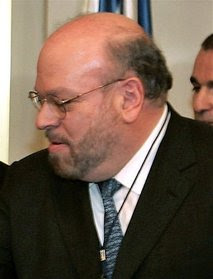
New York's attorney general filed civil fraud charges Monday against a hedge fund manager who funneled $2.4 billion to Wall Street swindler Bernard Madoff without telling clients where their money was going.
The complaint accuses J. Ezra Merkin, the former chairman of GMAC Financial Services, of concealing his links to Madoff and lying to investors about what he was doing with their money, telling most he was personally investing their cash in things like distressed debt.
Over the years, Merkin collected $470 million in fees and performance bonuses from his clients, the suit said. It said many of those customers, which included several large charities and colleges, had no idea where their money really was until December, when Madoff was arrested.
"Merkin duped individual investors, non-profits, and charities into believing he was responsibly managing their investments, when in actuality he was dumping them into history's largest Ponzi scheme," Attorney General Andrew Cuomo said in a statement.
The complaint also accused Merkin of mingling his personal funds with the accounts of his management company, Gabriel Capital Group, and using some of the company's funds for personal purchases, including $91 million worth of artwork for his apartment.
Merkin's attorney, Andrew Levander, called the lawsuit "hasty," "ill-conceived" and "without merit, and he denied that clients had been kept in the dark.
"Contrary to the attorney general's allegation, investors in the Ascot Funds were well aware that the money was being invested with Madoff," Levander said in a statement. Some of those investors had even met with Madoff personally, he said.
He said Merkin had investigated and analyzed Madoff and his trading strategy before investing.
"Unfortunately," he wrote, "Mr. Merkin's due diligence, just like the detailed investigations performed by countless others, including regulators, was thwarted by the intricate, fraudulent scheme perpetrated by Madoff."
Merkin also lost millions of dollars of his own money in the scheme, although those dollar amounts pale in comparison to the losses of his clients. One of Merkin's funds, Ascot Partners, sunk nearly every penny of its more than $1.7 billion in assets into Madoff's scheme.
Cuomo's suit, filed in state court in Manhattan, demands that Merkin repay all of the fees he collected from his clients over the years, plus damages.
The lawsuit is the second major regulatory action by a state against one of Madoff's so-called "feeder funds," which supplied him with billions of dollars in investor money.
On April 1, Massachusetts Secretary of State William Galvin accused Fairfield Greenwich Group of Connecticut of civil fraud for activities related to investments with Madoff.
Galvin accused the company, which had a $7.2 billion account with Madoff, of failing to disclose concerns about Madoff's operation to investors. Fairfield Greenwich officials have, like Merkin, also professed that they were innocent victims of the scam.
Madoff pleaded guilty in March to swindling thousands of investors out of billions of dollars in what could be the largest Ponzi scheme in history.
Many of those investors came to Madoff indirectly through hedge funds like Fairfield and Ascot.
Some of those investors have also sued. And Merkin was sued Monday in New York by Mortimer Zuckerman, the real estate magnate and publisher of the New York Daily News. Zuckerman said in the suit that he and his charitable trust collectively lost $40 million in the scheme.



